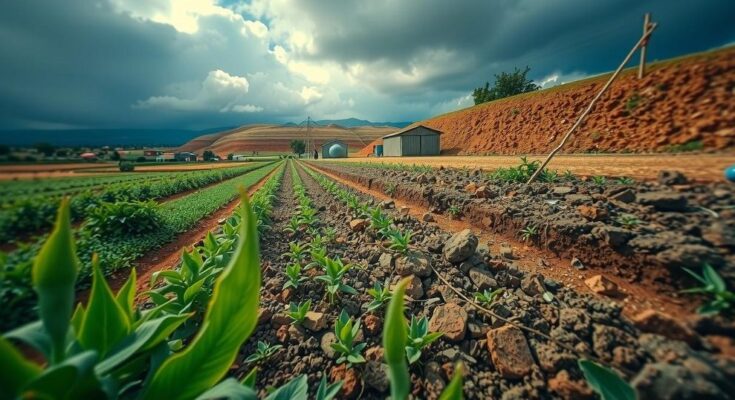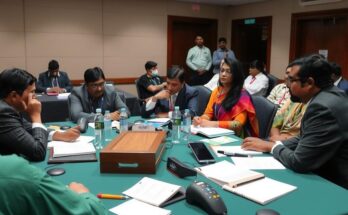Egypt faces severe threats to its agricultural sector and food security due to climate change, particularly impacting water resources reliant on the Nile. With historical declines in water availability and projections of reduced crop yields, the government emphasizes the urgency of adaptation measures. Strategies include shifting to resilient crops, enhancing irrigation methods, and revising land use policies, all aiming to mitigate the consequences of a changing climate.
Egypt is facing significant challenges in its agricultural sector due to climate change, which threatens its already limited water resources. Renowned for its hot desert climate and scarce rainfall, the country’s agriculture primarily relies on the Nile River and groundwater reserves. Prime Minister Mostafa Madbouly recently emphasized these issues during the inauguration of the New Valley Agricultural Exhibition, where experts discussed the impeding impacts of climate change on farming practices.
Research from the World Bank highlights that low-input farming systems in developing African nations, including Egypt, are particularly vulnerable to climate changes. The Nile, Egypt’s main water resource, is threatened by changing climate patterns, leading to concerns over food security as water availability has posed a continuous challenge. In the early 1990s, water availability per capita fell below 1,000 cubic meters, dropping to under 700 cubic meters by 2007, which is close to identifying water poverty.
Further impacts from climate change are anticipated. By the year 2050, the demand for water in agricultural sectors may surge by 16% during summer crop cultivation while potentially decreasing by 2% for winter crops. Significant reductions in crop yields are projected, with rice, maize, and soybean production likely to drop by at least 11-28%. Even so, some crops, such as cotton, are expected to thrive under increasing temperatures.
In response, the government is striving to implement adaptive measures to mitigate climate impacts. This includes changing sowing dates, utilizing more heat-tolerant crops, and employing better water management strategies. Notable interventions comprise enhancing irrigation methods and promoting higher genetic diversity in plant species.
Additionally, comprehensive strategies entail improving irrigation efficiency, revising land use policies to combat sea-level rise, and reinforcing rural community support to adapt to shifting agricultural practices. Egypt’s Vision 2030 framework underscores the urgency to address these climate challenges comprehensively.
Ultimately, addressing climate change through innovative agricultural practices is vital to ensuring Egypt’s long-term food security amidst evolving environmental conditions. Urgent research and strategic investment will be necessary for effective adaptation and resilience in the agricultural sector.
Understanding the impact of climate change on Egypt’s agricultural sector requires recognizing the geographical and environmental context. Egypt’s hot desert climate combined with limited rainfall creates inherent vulnerabilities for its agricultural productivity. The reliance on the Nile water resource makes it susceptible to fluctuations due to climate change. Studies indicate a historically declining trend in water availability, presenting clear risks to food security as climate conditions worsen. The significance of adaptive strategies becomes paramount as these factors converge, directly affecting the livelihoods of those dependent on agriculture.
In conclusion, Egypt’s agricultural sector is at a critical juncture where the effects of climate change demand immediate and effective adaptation measures. The anticipated increase in water demands combined with declining crop yields poses a grave threat to food security. However, proactive governmental strategies aimed at enhancing agricultural resilience and sustainable practices offer hope for the future. Without decisive action and ongoing research, the repercussions of climate change could have catastrophic impacts on Egypt’s agriculture and overall welfare.
Original Source: egyptianstreets.com




